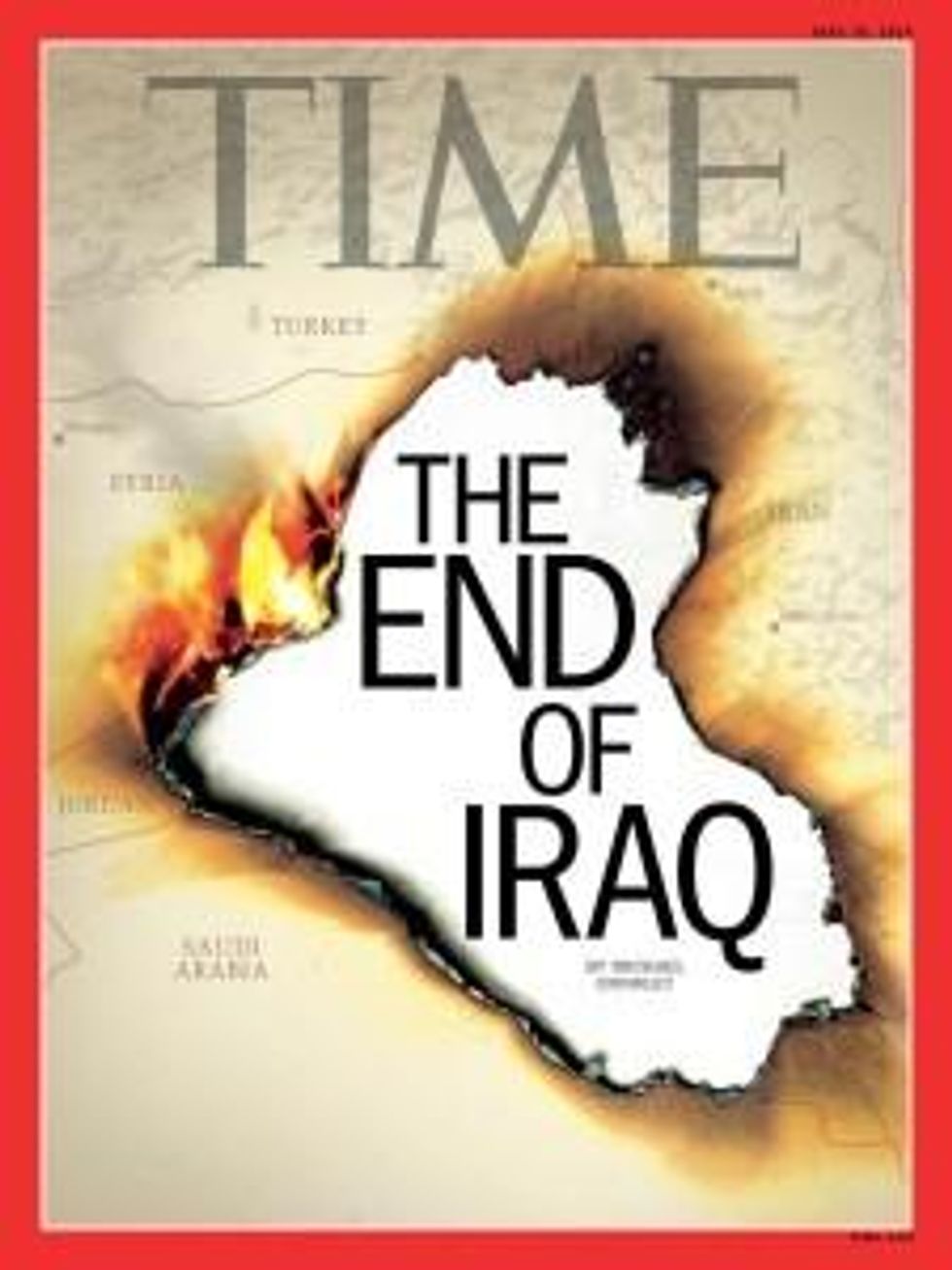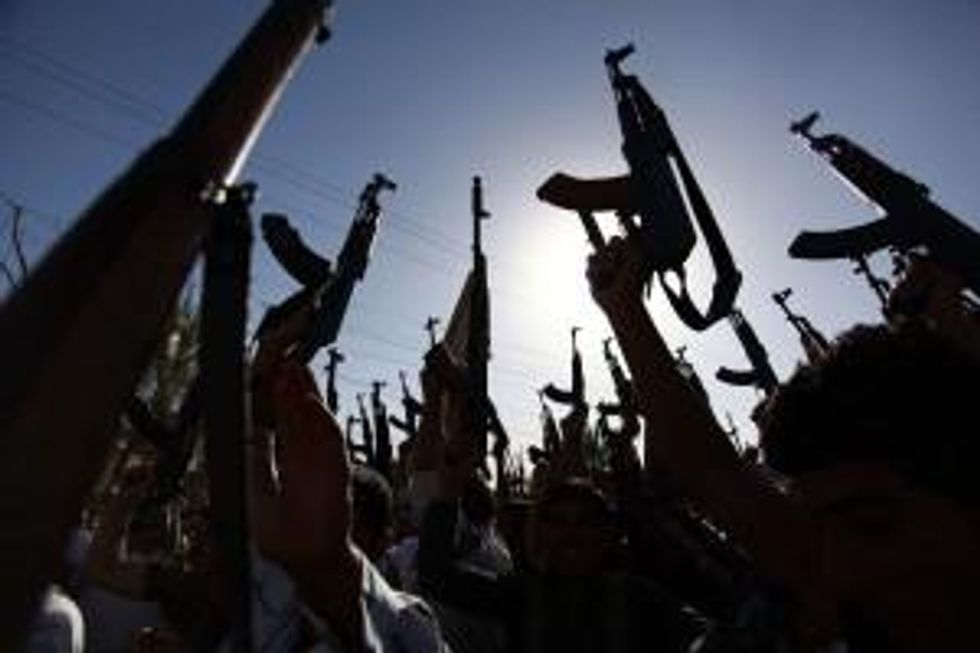TIME on Iraq War: What Did We Do to Deserve This?
With Iraq in crisis, many corporate news accounts treat the US war there as if it was something that was done to us, and the ensuing chaos proof that the good intentions of a US superpower cannot overcome tribal grievances.
Michael Crowley's cover story for Time (6/19/14), "The End of Iraq," might be the quintessential example. He writes:
The rapid march by ISIS from Syria into Iraq is only partly about the troubled land where the US lost almost 4,500 lives and spent nearly $1 trillion in increasingly vain hopes of establishing a stable, friendly democracy.
We tried to bring them a stable democracy, and look at what they're doing.
Crowley's statistic, of course, dismisses roughly 99 out of 100 human lives lost as a result of

ancient hatreds are grinding the country to bits. Washington has reacted with shock-no one saw it coming-and the usual finger pointing, but today's Washington is a place where history is measured in hourly news cycles and 140-character riffs. What's happening in Iraq is the work of centuries, the latest chapter in the story of a religious schism between Sunni and Shi'ite that was already old news a thousand years ago.
Why feel too bad about a 10-year-old invasion if what's really happening is "the work of centuries"? The notion of an intractable, tribal religious war is popular in the press, but it has been questioned; see Murtaza Hussain's "The Myth of the 1,400-Year Sunni/Shia War" (Al Jazeera, 7/9/13), for instance. And it functions as a way of letting the US off the hook for unleashing it. As Crowley writes, "To Americans weary of the Middle East, the urge is strong to close our eyes and, as Sarah Palin once put it so coarsely, 'let Allah sort it out.'"
To be clear, Crowley doesn't agree with regional expert Palin:
As long as the global economy still runs on Middle Eastern oil, Sunni radicals plot terrorist attacks against the West and Iran's leaders pursue nuclear technology, the US cannot turn its back.
One might assume that "nuclear technology" is code for weapons; Iran says it has no interest in the bomb, and there is no evidence that they do. But Time knows otherwise, as Crowley later writes of "Shi'ite Iran's march toward a nuclear weapon."
The language about "turning its back" seems to want to let the US off the hook for starting the Iraq War-and give a green light for intervening in its next phase with a clear conscience. If you don't think that line quite does it, Crowley also writes:
What Leon Trotsky supposedly said about war is also true of this war-torn region: Americans may not be interested in the Middle East. But the Middle East is interested in us.
Crowley is back to arguing that the region's problems are due to a religious conflict the West simply cannot fathom, as he wonders: "But how could the secular West hope to understand cultures in which religion is government, scripture is law and the past defines the future?"
The piece closes by stating its premise quite clearly, with Time explaining:
On a deeper level, the blame belongs to history itself. At this ancient crossroads of the human drama, the US's failure echoes earlier failures by the European powers, by the Ottoman pashas, by the Crusaders, by Alexander the Great. The civil war of Muslim against Muslim, brother against brother, plays out in the same region that gave us Cain vs. Abel. George W. Bush spoke of the spirit of liberty, and Obama often invokes the spirit of cooperation. Both speak to something powerful in the modern heart. But neither man-nor America itself-fully appreciated until now the continuing reign of much older spirits: hatred, greed and tribalism. Those spirits are loosed again, and the whole world will pay a price.
We offered them the spirits of cooperation and liberty and the modern heart, and this is the thanks we get. It's almost as if some people don't appreciate being invaded.
An Urgent Message From Our Co-Founder
Dear Common Dreams reader, The U.S. is on a fast track to authoritarianism like nothing I've ever seen. Meanwhile, corporate news outlets are utterly capitulating to Trump, twisting their coverage to avoid drawing his ire while lining up to stuff cash in his pockets. That's why I believe that Common Dreams is doing the best and most consequential reporting that we've ever done. Our small but mighty team is a progressive reporting powerhouse, covering the news every day that the corporate media never will. Our mission has always been simple: To inform. To inspire. And to ignite change for the common good. Now here's the key piece that I want all our readers to understand: None of this would be possible without your financial support. That's not just some fundraising cliche. It's the absolute and literal truth. We don't accept corporate advertising and never will. We don't have a paywall because we don't think people should be blocked from critical news based on their ability to pay. Everything we do is funded by the donations of readers like you. Will you donate now to help power the nonprofit, independent reporting of Common Dreams? Thank you for being a vital member of our community. Together, we can keep independent journalism alive when it’s needed most. - Craig Brown, Co-founder |
With Iraq in crisis, many corporate news accounts treat the US war there as if it was something that was done to us, and the ensuing chaos proof that the good intentions of a US superpower cannot overcome tribal grievances.
Michael Crowley's cover story for Time (6/19/14), "The End of Iraq," might be the quintessential example. He writes:
The rapid march by ISIS from Syria into Iraq is only partly about the troubled land where the US lost almost 4,500 lives and spent nearly $1 trillion in increasingly vain hopes of establishing a stable, friendly democracy.
We tried to bring them a stable democracy, and look at what they're doing.
Crowley's statistic, of course, dismisses roughly 99 out of 100 human lives lost as a result of

ancient hatreds are grinding the country to bits. Washington has reacted with shock-no one saw it coming-and the usual finger pointing, but today's Washington is a place where history is measured in hourly news cycles and 140-character riffs. What's happening in Iraq is the work of centuries, the latest chapter in the story of a religious schism between Sunni and Shi'ite that was already old news a thousand years ago.
Why feel too bad about a 10-year-old invasion if what's really happening is "the work of centuries"? The notion of an intractable, tribal religious war is popular in the press, but it has been questioned; see Murtaza Hussain's "The Myth of the 1,400-Year Sunni/Shia War" (Al Jazeera, 7/9/13), for instance. And it functions as a way of letting the US off the hook for unleashing it. As Crowley writes, "To Americans weary of the Middle East, the urge is strong to close our eyes and, as Sarah Palin once put it so coarsely, 'let Allah sort it out.'"
To be clear, Crowley doesn't agree with regional expert Palin:
As long as the global economy still runs on Middle Eastern oil, Sunni radicals plot terrorist attacks against the West and Iran's leaders pursue nuclear technology, the US cannot turn its back.
One might assume that "nuclear technology" is code for weapons; Iran says it has no interest in the bomb, and there is no evidence that they do. But Time knows otherwise, as Crowley later writes of "Shi'ite Iran's march toward a nuclear weapon."
The language about "turning its back" seems to want to let the US off the hook for starting the Iraq War-and give a green light for intervening in its next phase with a clear conscience. If you don't think that line quite does it, Crowley also writes:
What Leon Trotsky supposedly said about war is also true of this war-torn region: Americans may not be interested in the Middle East. But the Middle East is interested in us.
Crowley is back to arguing that the region's problems are due to a religious conflict the West simply cannot fathom, as he wonders: "But how could the secular West hope to understand cultures in which religion is government, scripture is law and the past defines the future?"
The piece closes by stating its premise quite clearly, with Time explaining:
On a deeper level, the blame belongs to history itself. At this ancient crossroads of the human drama, the US's failure echoes earlier failures by the European powers, by the Ottoman pashas, by the Crusaders, by Alexander the Great. The civil war of Muslim against Muslim, brother against brother, plays out in the same region that gave us Cain vs. Abel. George W. Bush spoke of the spirit of liberty, and Obama often invokes the spirit of cooperation. Both speak to something powerful in the modern heart. But neither man-nor America itself-fully appreciated until now the continuing reign of much older spirits: hatred, greed and tribalism. Those spirits are loosed again, and the whole world will pay a price.
We offered them the spirits of cooperation and liberty and the modern heart, and this is the thanks we get. It's almost as if some people don't appreciate being invaded.
With Iraq in crisis, many corporate news accounts treat the US war there as if it was something that was done to us, and the ensuing chaos proof that the good intentions of a US superpower cannot overcome tribal grievances.
Michael Crowley's cover story for Time (6/19/14), "The End of Iraq," might be the quintessential example. He writes:
The rapid march by ISIS from Syria into Iraq is only partly about the troubled land where the US lost almost 4,500 lives and spent nearly $1 trillion in increasingly vain hopes of establishing a stable, friendly democracy.
We tried to bring them a stable democracy, and look at what they're doing.
Crowley's statistic, of course, dismisses roughly 99 out of 100 human lives lost as a result of

ancient hatreds are grinding the country to bits. Washington has reacted with shock-no one saw it coming-and the usual finger pointing, but today's Washington is a place where history is measured in hourly news cycles and 140-character riffs. What's happening in Iraq is the work of centuries, the latest chapter in the story of a religious schism between Sunni and Shi'ite that was already old news a thousand years ago.
Why feel too bad about a 10-year-old invasion if what's really happening is "the work of centuries"? The notion of an intractable, tribal religious war is popular in the press, but it has been questioned; see Murtaza Hussain's "The Myth of the 1,400-Year Sunni/Shia War" (Al Jazeera, 7/9/13), for instance. And it functions as a way of letting the US off the hook for unleashing it. As Crowley writes, "To Americans weary of the Middle East, the urge is strong to close our eyes and, as Sarah Palin once put it so coarsely, 'let Allah sort it out.'"
To be clear, Crowley doesn't agree with regional expert Palin:
As long as the global economy still runs on Middle Eastern oil, Sunni radicals plot terrorist attacks against the West and Iran's leaders pursue nuclear technology, the US cannot turn its back.
One might assume that "nuclear technology" is code for weapons; Iran says it has no interest in the bomb, and there is no evidence that they do. But Time knows otherwise, as Crowley later writes of "Shi'ite Iran's march toward a nuclear weapon."
The language about "turning its back" seems to want to let the US off the hook for starting the Iraq War-and give a green light for intervening in its next phase with a clear conscience. If you don't think that line quite does it, Crowley also writes:
What Leon Trotsky supposedly said about war is also true of this war-torn region: Americans may not be interested in the Middle East. But the Middle East is interested in us.
Crowley is back to arguing that the region's problems are due to a religious conflict the West simply cannot fathom, as he wonders: "But how could the secular West hope to understand cultures in which religion is government, scripture is law and the past defines the future?"
The piece closes by stating its premise quite clearly, with Time explaining:
On a deeper level, the blame belongs to history itself. At this ancient crossroads of the human drama, the US's failure echoes earlier failures by the European powers, by the Ottoman pashas, by the Crusaders, by Alexander the Great. The civil war of Muslim against Muslim, brother against brother, plays out in the same region that gave us Cain vs. Abel. George W. Bush spoke of the spirit of liberty, and Obama often invokes the spirit of cooperation. Both speak to something powerful in the modern heart. But neither man-nor America itself-fully appreciated until now the continuing reign of much older spirits: hatred, greed and tribalism. Those spirits are loosed again, and the whole world will pay a price.
We offered them the spirits of cooperation and liberty and the modern heart, and this is the thanks we get. It's almost as if some people don't appreciate being invaded.


